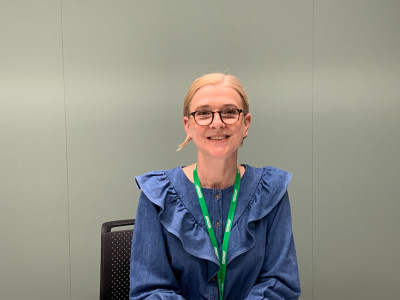
The CNS development lead (CDL) role, led by the NCL Cancer Alliance, is funded by Macmillan Cancer Support and NHS England, with a CDL being placed in each of the five London integrated care systems. In NCL, the role is hosted at the Royal Free London (RFL), and the programme is designed to help cancer CNSs develop their skills through teaching, observation, and coaching techniques.
A cancer clinical nurse specialist is a registered nurse with advanced training in oncology. They provide specialised care, support, and education to cancer patients and their families throughout the cancer journey, from diagnosis to treatment and beyond.
Liz Quaglia has held the CDL role since September and works across all hospitals in NCL, currently supporting 34 CNSs, including 15 at the RFL.
“The most important part of the role is supporting and developing newly appointed CNSs across the North Central London and within the Royal Free London,” Liz said.
“Up until recently, there has been no recognised route into CNS work or a general way that people prepare for or train for the role. This programme is looking at changing that and creating a more uniform path.”
“Every week is different, but I try to have anchors on different days of the week so that CNSs across all hospitals I cover know where I am,” Liz continued.
“Feedback has been really good so far, I would like to think! It is great to give people the opportunity and space to focus on their own development, which is sometimes difficult to prioritise in a busy hospital. We’ve got some brilliant CNSs coming through and it’s great to see them make the roles their own.”
Liz qualified as a nurse in 1996 and quickly moved into oncology, and has spent most of her career at the RFL. She has held various oncology roles, including chemotherapy suite work and research nursing, and became a CNS in 2004. Most recently, she led the CNS team within the neuroendocrine service at the Royal Free Hospital – one of the trust’s most specialised areas.
She emphasised the vital role that CNSs play in patient experience.
“They are central to everything to do with the patient’s experience of their cancer journey – it’s as simple as that. They are the accessible professional within a hospital and someone patients know how to contact.
“Everything they do is evidence based, they are supporters of research, and they are clinical leaders on the ground for the nursing workforce.”
Liz is also opening the door to the aspiring oncology workforce and give all nursing colleagues the opportunity to explore roles in cancer care.
“I am putting together a cancer open day to identify all the roles that are available to all nursing colleagues, as there are more than just CNS roles, including chemotherapy nursing or cancer research nursing. I have done a lot of them myself, and they are really exciting jobs."
Eilish Cunningham is a hepatocellular carcinoma CNS, and has been in the post since November 2024. She said Liz’s role has helped her address some of the challenging aspects of CNS work.
“At times it has been helpful to have somebody impartial to speak to that fully understands the CNS role and the challenges we face,” Eilish said.
“Liz has been easy to contact and talk to, and has also helped with changing my mindset and shown me what skills I have to bring to the table when at times I have felt very overwhelmed by work. I feel more able to manage and prioritise my workload to ensure the best patient care is provided.”
The Royal Free London is marking one year since the launch of our clinical strategy, with cancer being one of our group priorities.
 Translate
Translate